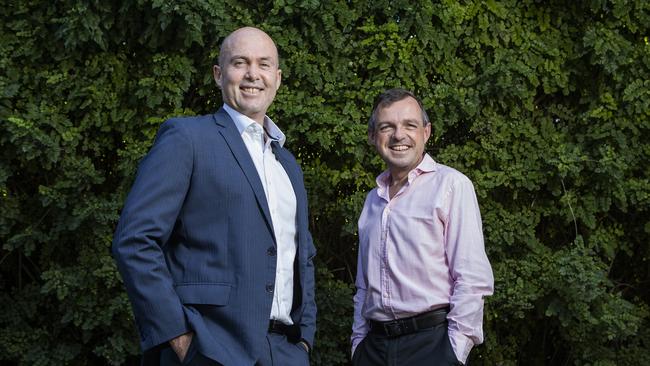Digital player Volt gets full banking licence
Digital player Volt says it can bring real competition to the big banks now it has an unrestricted licence to operate.

The banking regulator has granted start-up Volt a fully-fledged banking licence, paving the way for a battle between digital players and scandal-ridden incumbent banks this year.
Volt told The Australian after the gruelling task of securing the licence the next challenge would be attracting further partners and customers to its online-only bank.
“We haven’t got overexcited that people are going to switch in droves,” Volt chief Steve Weston said. “We have modest growth targets and the major banks have about 80 per cent share (in home loans and deposits) so there is plenty to go around.”
Volt wants to shake things up by offering technology such as face recognition, quicker switching options, and budgeting and savings tools including being able to lock your bank account to control spending. It is also targeting segments of the market including foreign students and is assessing introducing retail partners that may facilitate discounts.
Mr Weston reiterated that he would be disappointed if Volt didn’t hit 1 per cent market share in the $1.7 trillion local mortgage industry within 10 years. That level is about half the share of Macquarie Bank’s home loan market share.
The Australian Prudential Regulation Authoritysaid on Tuesdayit had granted Volt a licence to operate as an authorised deposit-taking institution “without restrictions” under the Banking Act 1959.
Volt was the first independent digital bank to receive a restricted licence from APRA in May last year.
The restricted banking licence category was introduced by APRA to help digital, online-only banks gain easier entry to the local market and start offering limited services to customers.
“If a firm has got to a full licence they have earned their stripes … getting a full banking licence is incredibly difficult,” Mr Weston said of the process.
Digital banks are gearing up for a fight against the big banks in 2019, against the backdrop of a potentially damaging Hayne royal commission final report into misconduct in the sector. The final recommendations will be delivered to the federal government by February 1, and follow revelations last year of a spate of bad behaviour at banks, including pressure sales tactics and charging advice fees to dead people.
The digital banking industry does, however, have its own challenges and is set to get more crowded. Cuscal-backed 86 400 has opted to pursue a full APRA licence from the outset, while start-up Xinja has secured a restricted licence and is targeting a full one by the end of the June quarter.
New players will also be mindful that National Australia Bank-owned UBank has a head start in the digital-only space, while another online-only player Up is in the market drawing on the licence of Bendigo and Adelaide Bank.
Larger banks haven’t, though, always had a positive experience in pushing into the online space, with Commonwealth Bank ditching its Homepath brand after it failed to make inroads in the mortgage market.
Treasurer Josh Frydenberg welcomed the entry of Volt to the banking market and said the government had introduced a number of reforms to reduce barriers to entry in the banking industry.
“Increasing competition in the banking sector to give consumers more choice, lower prices and better service is part of the government’s plan for a stronger economy,” he said.
Globally, large banks have also pushed into the digital banking space including Goldman, Royal Bank of Scotland. Clydesdale Bank and Yorkshire Bankhave an online and mobile-only bank dubbed B. Digital banks in the UK — the likes of Atom Bank, Monzo, Revolut and Starling Bank — have made notable inroads in that market in the past five years, some in partnership with larger banks.
Mr Weston said while Volt had fielded partnership approaches from “some of the biggest banks in the world”, the company was committed to going it alone in the near term.
“That’s an option for us in the future,” he added.
The digital-only banks want to capitalise on new technology and in this market a growing mistrust of the big banks during the fallout of the royal commission.
“We are committed to showing Australians that banking can be done in a simpler and better way,” Mr Weston said.
“Against the backdrop of systematic failures and breaches of trust by incumbent banks, our mission is simple: to empower people and make financial services easier. It’s about giving Australians a fundamentally different banking experience, one that is honest and fair.”
Mr Weston is former Barclays and National Australia Bank executive who co-founded the company with former colleague and banker Luke Bunbury.
Volt will introduce consumer deposit and lending products during 2019, before wading into the small business banking market next year.
Digital, or “neobanks”, as they are often referred to, are typically fintech companies focusing on mobile and digital banking without the costs of traditional branches.
Volt has 100 employees and has forged several industry partnerships, including becoming PayPal’s only Australian banking partner to date and inking an alliance with ASX-listed Collection House.
So far, Volt has raised more than $45 million in equity capital via multiple funding rounds. This includes an $8.5m investment from Collection House.
To fund mortgages Volt will rely on a range of funding sources, including deposits, and is also in talks with local and offshore based banks about a warehouse funding line.
The company has several projects afoot including Volt Labs, an app-based online community that allows customers to provide insights and ideas for designing products and services.




To join the conversation, please log in. Don't have an account? Register
Join the conversation, you are commenting as Logout